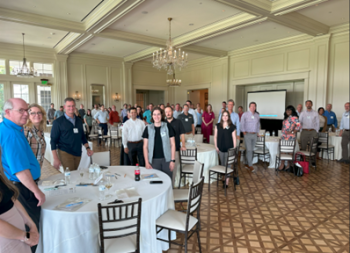Winter Workplace Hazards: Understanding Workers’ Compensation Claims in North Carolina
As winter sets in and temperatures drop, hazardous conditions emerge making surfaces like parking lots, walkways, and floors more slippery and dangerous. This increase in slick surfaces significantly raises the risk of slips and falls, often resulting in workers’ compensation claims. Additionally, employees who work for extended periods in cold environments such as warehouse workers and construction workers are at risk for developing health conditions like hypothermia, frostbite, and respiratory illnesses which can also lead to workers’ compensation claims.
The North Carolina Supreme Court has established that when an employee is exposed to specific hazards such as excessive cold weather, the resulting disability or death is generally considered compensable. See Fields v. Tompkins-Johnston Plumbing Co., 224 N.C. 841, 32 S.E.2d 623 (1945). This means the North Carolina Industrial Commission will assess whether the employee’s work environment subjects them to a greater risk than they would face outside of work. For example, if an employee works in extremely cold conditions and develops frostbite as a result, their workers’ compensation claim will likely be considered compensable. Whereas, if an employee’s injury or condition arises from factors unrelated to the conditions of their work environment such as a medical condition that pre-existed their claim, the claim is less likely to be deemed compensable.
With slip and falls caused by cold weather hazards, such as icy parking lots and sidewalks, generally the Commission determines whether the alleged injury was caused by an accident and whether the accident arose out of and in the course of employment. For instance, if an employee slips on a wet or icy floor while performing their job duties, perhaps caused by individuals tracking in winter elements, this may be deemed a viable claim. Whereas, if an employee slips and falls while completing a personal errand at home during their work hours, their claim may not be compensable, depending on the details of their particular employment. A claim may also fail to fall within the NC Workers’ Compensation Act if the slip and fall occurs outside of the employee’s authorized work hours.
Another important nuance to consider involves situations where employer parking lots become slippery due to ice or snow. The North Carolina Supreme Court has indicated in most circumstances if the parking lot where an employee slips and falls is owned, controlled, or maintained by the employer, the claim will be considered compensable. See Barham v. Food World, Inc, 300 N.C. 329, 286 S.E.2d 676 (1980).
When dealing with a workers’ compensation claim related to cold weather conditions, it is crucial to seek guidance. Factors like time, location, and the specific circumstances of an accident can significantly impact the compensability of a claim. At Hedrick Gardner, we bring a wealth of knowledge and experience to guide you through the complexities of workers’ compensation claims. Please consult with our team to ensure you obtain the best possible outcome.


